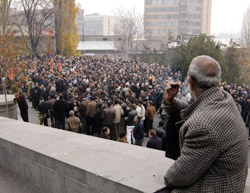The key meaning of the pre-election situation in Armenia can be explained in one sentence: the authorities are doing their best to be reproduced. The problem is that the authorities are not trying to reproduce their power only, but they are trying to reproduce all the political system that exists now.
To note, the governmental power does not consist of only governmental parties, but some oppositional ones as well. The parliamentarian majority does all what they want, rules the country as they want; as for the parliamentary opposition, they only criticize them and can’t change anything. This is the whole system that the authorities are trying to reproduce.
Do only the governmental powers want to reproduce this system? For instance, APP (Armenian People’s Party) has 15% in the parliament, but does not have any influence on the political processes in the parliament. If the APP is ready to participate in the upcoming parliamentary elections and have the same 15% in the parliament, it means that they want this system to be reproduced too. In other words, they want to reach a situation when they have 15% in the parliament, criticize the government but not change anything. We can say the same thing about the other oppositional powers as well (“National Unity”, “Legal State”, “Heritage”, etc.). It is clear that by participating in the elections separately the opposition cannot do more than they did in 2003 since people trusted in them more before than they do now. Thus, they may get maximum as many votes as they did in 2003 (maximum). This means that they are consciously trying to reproduce the existing political system.
Now let’s discuss the issue other way. There are political powers that want to reproduce the governmental system. There are oppositional powers that are interested in the same too (it doesn’t matter they are a little more or less). In a word, hey are interested in the same goal. Do you think cooperation is impossible between them? I think this cooperation is not only possible, but it is logical as well. In fact, in this framework both the governmental and the mentioned oppositional powers are partners in interest and it is logical that they may collaborate.
Now about democratic elections. It is logical that the governmental powers may violate the elections. They will stuff ballots, distribute electoral bribe, campaign illegally and “paint” figures (you can see campaign posters of governmental parties in the streets already). This is only the black side of the electoral violations that is visible. If the electoral process is not violated it does not mean yet that the elections are democratic.
The meaning of democratic elections is to give an opportunity to citizens to make a choice between the governing and oppositional powers. Usually politics doesn’t look in black and white only, but the existing political field in Armenia supposes that people are faced with a choice between the black and the white. A question originates: can people make a choice between the black and the white? No, they can’t because about 10-12 oppositional parties are going to use the same slogans when campaigning. The elections cannot be considered fair if the voters don’t have an opportunity to make a real choice. The problem is not the transparency and legitimacy of the elections, but the confusion in the political field since voters that want to elect the opposition don’t know whom to elect and which ones. It turns out that the governmental powers have undertaken the responsibility for the “black job” of violating the elections, and the oppositional powers – the core “job”. This means that there is cooperation. This does not mean that they have conducted negotiations and met with each other. Usually in politics the powers understand each other without any words when their interests are the same, furthermore, now they understand each other better since this is not the first time they are getting prepared for elections.
In other words, we can’t say which powers affect the legitimacy of elections more.

